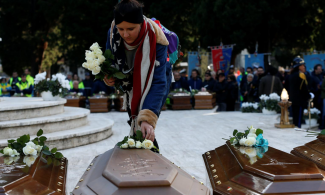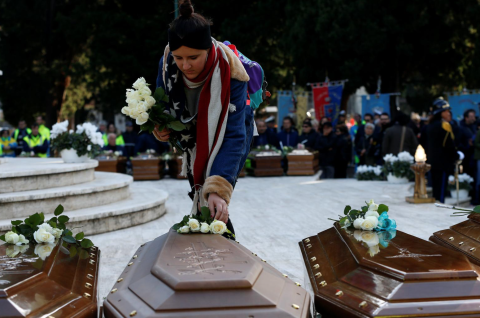
According to the organization, government’s inability to send a single representative to the burial of the all-female victims, which held last week at a cemetery in southern Italy, was a national embarrassment.
The Committee for the Defence of Human Rights (CDHR) has condemned in unmistakable terms, federal government’s silence on the death of 26 young Nigerian girls that perished at the Mediterranean. According to the organization, government’s inability to send a single representative to the burial of the all-female victims, which held last week at a cemetery in southern Italy, was a national embarrassment.
The group also thrashed the federal government for the humiliating story of Nigerians being sold as slaves in Libya and other parts of North Africa.
Speaking at the weekend on the tragedies, president of CDHR, Mr. Malachy Ugwummadu blamed the government for this and other avoidable deaths and dehumanizing experiences within and outside Nigeria.
He said the story of these thriving slaves markets where Nigerians are sold in Libya and other parts of North Africa should ordinarily rouse a serious government but that he would be surprised if the Nigeria government rises to the occasion. He wondered why a Nigerian would be sold as slave in this age for a paltry sum $400 in Africa and the government is yet to declare a state of emergency on unemployment.
He insisted that the failure of leadership in Nigeria to provide a conducive economic environment pushed these young men to embark on desperate travels to North Africa, just like the girls who perished at the Mediterranean.
“This silence is troubling and deplorable. We also see in this silence the federal government’s refusal to publicly take responsibility, considering the fact that these people apparently took this ;suicide mission' as a means of survival in their desperate search for livelihood.
“To use a common cliché, the federal government added salt to injury and disrespected the dead when it refused to send a representative either through the Ministry of Foreign Affairs or office of the Special Adviser to the President on Diaspora. As we speak, nobody knows the names of the victims, so their final resting places would remain a mystery to their families.
“No doubt, development like this gives the impression that this circle of deaths that have remained perennial at the Mediterranean is normal and acceptable to the Nigerian government. Unfortunately, when the government decides to speak, it ascribes their misfortune to the victims’ indiscretion which further exposes the poverty of the Nigerian situation where citizens now prefer to die rather than live in indignity.
"As a human rights organization, CDHR is particularly concerned about the abuse of the fundamental rights to life of these young Nigerians under Section 33 and dignity to human person, under Section 34 of the Constitution of the Federal Republic of Nigeria (1999) (As Amended).
“As we mourn these victims, we wish to emphasize, even at the risk of sounding repetitive, that every government has responsibilities. We all know that lack of economic opportunities is at the root of these desperate journeys. And this is a breach of their constitutional rights under Section 14 (2)(B) of the 1999 Constitution as amended which is to the effect that the security and welfare of the people shall be the primary purpose of government.”
Ugwummadu therefore called on government at all levels to quickly rethink their employment and welfare schemes so as to avoid a repeat of theses regrettable occurrences.
On November 5, the world watched in horror as endless body bags of young Nigerian girls came out of a Spanish ship, Cantabria, which picked up the dead bodies at the Mediterranean.
